[Dec 2007, Volume 4 Quarterly Issue] Pdf File size - The IIPM Think ...
[Dec 2007, Volume 4 Quarterly Issue] Pdf File size - The IIPM Think ...
[Dec 2007, Volume 4 Quarterly Issue] Pdf File size - The IIPM Think ...
Create successful ePaper yourself
Turn your PDF publications into a flip-book with our unique Google optimized e-Paper software.
MORE MARKETS, LESS GOVERNMENT<br />
like immunisation, social forestry, reforestation<br />
of hill sides or de-silting of waterways<br />
etc. have a direct impact on the<br />
livelihood and quality of life of the poor.<br />
By generating pressure from the demand<br />
side on the political system, marketisation<br />
can help to produce more of<br />
them and make a difference. We also<br />
gain from the supply side. Since producers<br />
are to make a profit at the end of the<br />
day, every rupee of taxpayer drawn into<br />
the work has to work efficiently. It may<br />
appear puzzling that there should be<br />
any scope for profit in these services. If<br />
the government were to do the job it is<br />
not expected to make a profit out of it.<br />
Taxpayers would then just pay for the<br />
cost. However that cost contains, as experience<br />
tells, not only the technically<br />
required cost but that of inappropriate<br />
technical and political choices, of bureaucratic<br />
delays, of coalition politics<br />
and above all of general inefficiency. For<br />
the same amount of money budgeted for<br />
a project, the suggested system promises<br />
to meet the stipulated quality and<br />
complete it in time with a profit to spare<br />
for the producers. In a sense the profit<br />
is hidden in the present system. It is enjoyed<br />
by bureaucrats and government<br />
workers not in cash but in kind. It takes<br />
the form of the luxury of slack work environment<br />
and unaccountability. It is<br />
this hidden profit that motivates private<br />
firms as much as it motivates some government<br />
workers to prefer jobs in these<br />
areas. <strong>The</strong> latter take it in kind while<br />
private business would convert it to cash<br />
profit. But the winner would be the public<br />
who would get more services, done in<br />
time at lower cost. To get this going we<br />
need to initiate a market-like environment<br />
by announcing that these services<br />
will be bought on the market. This will<br />
spawn an industry producing these services<br />
that will not only efficiently produce<br />
better quality service but also generate<br />
a demand side awareness to sustain the<br />
industry. United States, North Europe<br />
and Pacific countries like Japan, Australia<br />
and New Zealand have made big<br />
strides in the technology of environment<br />
protection and nurturing in the last decade.<br />
<strong>The</strong> business model generates ample<br />
incentive for cost-cutting, improvement<br />
of technology and research. A<br />
switch to this model could help us to<br />
make significant difference to the lives<br />
of lower income people and also reduce<br />
resource costs in the long run.


![[Dec 2007, Volume 4 Quarterly Issue] Pdf File size - The IIPM Think ...](https://img.yumpu.com/29766298/40/500x640/dec-2007-volume-4-quarterly-issue-pdf-file-size-the-iipm-think-.jpg)

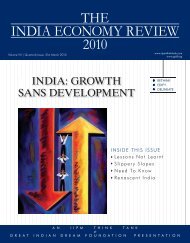
![[Feb 2008, Volume V Annual Issue] Pdf File size - The IIPM Think Tank](https://img.yumpu.com/43961117/1/190x245/feb-2008-volume-v-annual-issue-pdf-file-size-the-iipm-think-tank.jpg?quality=85)
![[June 2008, Volume V Quarterly Issue] Pdf File size - The IIPM Think ...](https://img.yumpu.com/41693247/1/190x245/june-2008-volume-v-quarterly-issue-pdf-file-size-the-iipm-think-.jpg?quality=85)


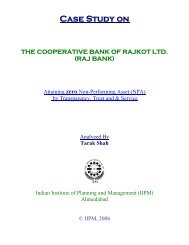


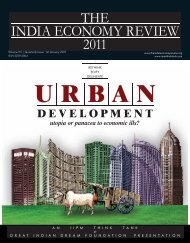

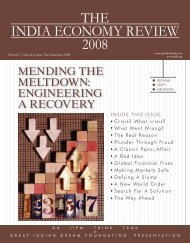
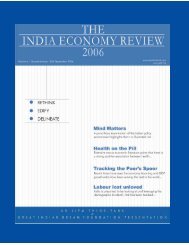
![[Volume VI | Quarterly Issue: 31st May 2009] Pdf File size](https://img.yumpu.com/27796051/1/190x245/volume-vi-quarterly-issue-31st-may-2009-pdf-file-size.jpg?quality=85)